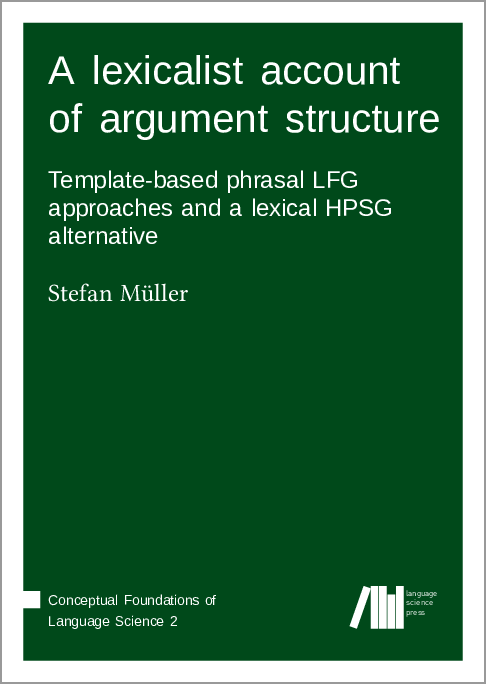We log anonymous usage statistics. Please read the privacy information for details.
A lexicalist account of argument structure: Template-based phrasal LFG approaches and a lexical HPSG alternative
Keywords:
morphology, syntax, lexical integrity, lexicalism, construction, construction grammar, passive, generalization, resultative construction, benefactive constrcution, German, English, LFG, HPSG, CxGSynopsis
Currently, there are two prominent schools in linguistics: Minimalism (Chomsky) and Construction Grammar (Goldberg, Tomasello). Minimalism comes with the claim that our linguistic capabilities consist of an abstract, binary combinatorial operation (Merge) and a lexicon. Most versions of Construction Grammar assume that language consists of flat phrasal schemata that contribute their own meaning and may license additional arguments. This book examines a variant of Lexical Functional Grammar, which is lexical in principle but was augmented by tools that allow for the description of phrasal constructions in the Construction Grammar sense. These new tools include templates that can be used to model inheritance hierarchies and a resource driven semantics. The resource driven semantics makes it possible to reach the effects that lexical rules had, for example remapping of arguments, by semantic means. The semantic constraints can be evaluated in the syntactic component, which is basically similar to the delayed execution of lexical rules. So this is a new formalization that might be suitable to provide solutions to longstanding problems that are not available for other formalizations.
While the authors suggest a lexical treatment of many phenomena and only assume phrasal constructions for selected phenomena like benefactive and resultative constructions in English, it can be shown that even these two constructions should not be treated phrasally in English and that the analysis would not extend to other languages as for instance German. I show that the new formal tools do not really improve the situation and many of the basic conceptual problems remain. Since this specific proposal fails for two constructions, it follows that proposals (in the same framework) that assume phrasal analyses for all constructions are not appropriate either.
The conclusion is that lexical models are needed and this entails that the schemata that combine syntactic objects are rather abstract (as in Categorial Grammar, Minimalism, HPSG and standard LFG). On the other hand there are constructions that should be treated by very specific, phrasal schemata as in Construction Grammar and LFG and HPSG. So the conclusion is that both schools are right (and wrong) and that a combination of ideas from both camps is needed.




